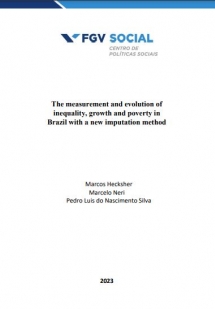
The measurement and evolution of inequality, growth and poverty in Brazil with a new imputation method (in english) - HECKSHER, Marcos, Neri, Marcelo Cortes, Silva, Pedro Luis do Nascimento
Sobre o paper:
This paper develops a new imputation methodology applied to missing income values in PNAD. PNAD was the main Brazilian household survey but with no income imputation. The imputation process starts fitting regression models considering complex sampling design applied to different income sources. Later this procedure is combined with stochastic methods. In 2015, 2.5% of the sample had per capita incomes imputed resulting in slightly higher levels of inequality due to higher frequencies of imputations in the two extremes of the distribution. The changes from 1995 to 2015 in mean income, inequality and poverty were only slightly affected by imputation. We took advantage of the methodology proposed to impute while preserving pressure points in income distributions associated with Brazilian labour market regulatory features such as national and regional minimum wages.
1. Imputation Methods; 2. Stochastic Imputation; 3. Inequality; 4. Poverty; 5. Missing Incomes.




